Theresa May, David Cameron, Tony Blair and Sir John Major hail 50th anniversary of landmark gay reforms
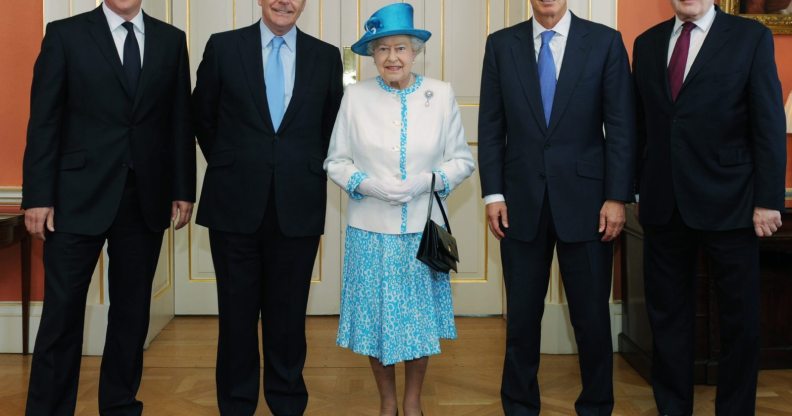
Britain’s Queen Elizabeth II (C) poses with (L-R) British Prime Minister David Cameron and former prime ministers John Major, Tony Blair and Gordon Brown for a photograph ahead of a Diamond Jubilee lunch hosted by Cameron at 10 Downing Street in London on July 24, 2012. AFP PHOTO / POOL / STEFAN ROUSSEAU / AFP / POOL / STEFAN ROUSSEAU (Photo credit should read STEFAN ROUSSEAU/AFP/Getty Images)
PinkNews Exclusive
Thursday 27 July 2017 marks 50 years since homosexuality was partially decriminalised in England and Wales.
The move allowed men to have sex with men, provided they were two consenting adults, aged over 21, in their own home and there was nobody else in the building.
It wasn’t a sweeping reform which immediately transformed the lives of gay and bisexual men.
But it did start a movement for LGBT rights that has continued through five decades, with same-sex marriage introduced in 2013.
Political leaders were not always on side – Margaret Thatcher, who in fact rebelled against her party to support decriminalisation, is widely condemned by the LGBT community.
Today, four out of five living British Prime Ministers – all of whom support equal marriage – write for PinkNews, as they hail five decades of progress.
PinkNews will be publishing a fifth piece from Gordon Brown on Thursday 27 July.
Theresa May (2016-Present)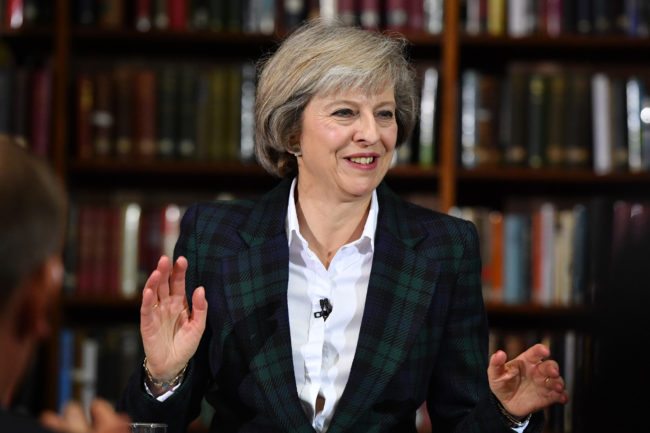 This month sees the fiftieth anniversary of the Sexual Offences Act in England and Wales, which – sponsored by a Labour MP and a Conservative peer – was a cross-party breakthrough in the fight for equality. But as we celebrate, it is also right that we reflect on that moment to remind ourselves that there is much more to do.
This month sees the fiftieth anniversary of the Sexual Offences Act in England and Wales, which – sponsored by a Labour MP and a Conservative peer – was a cross-party breakthrough in the fight for equality. But as we celebrate, it is also right that we reflect on that moment to remind ourselves that there is much more to do.
The momentous changes to the law in 1967 started the journey towards equality which has continued into this decade with same-sex marriage – but while 1967 was a landmark, it took many more decades for it to become widely accepted that a person’s sexuality and gender identity are things to respect and celebrate.
Today we remembered and celebrated those who knew what was right and fought for it tirelessly, who were way ahead of the politics of their time, and who shifted public attitudes on LGBT+ equality.
I am proud of the role my Party has played in recent years in advocating a Britain which seeks to end discrimination on the grounds of sexuality or gender identity, but I acknowledge where we have been wrong on these issues in the past.
There will justifiably be scepticism about the positions taken and votes cast down through the years by the Conservative Party, and by me, compared to where we are now.
But like the country we serve, my Party and I have come a long way.
David Cameron (2010-2016)
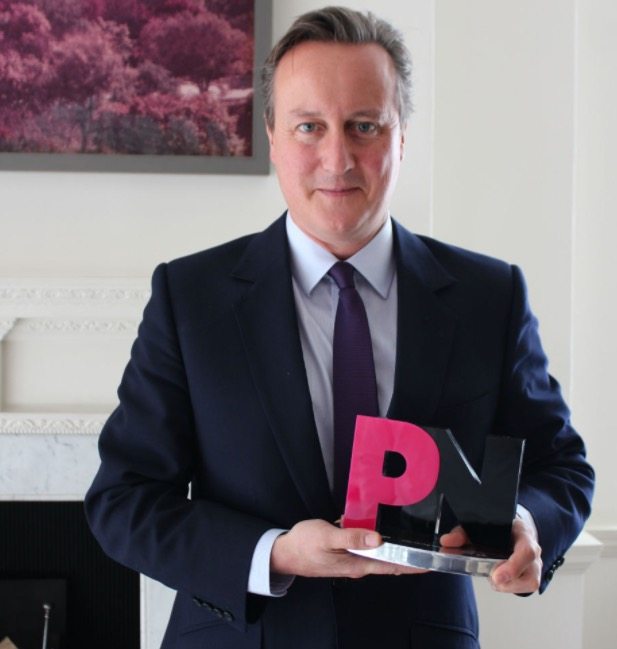
50 years ago this month the Sexual Offences Act 1967 was passed – partially decriminalising male homosexuality in England and Wales. The Act was far from perfect, but a significant starting point on the long road to true equality.
We’re still on that road and, of course, more needs to be done, particularly on the vital task of working internationally to change laws and attitudes. But this anniversary is a good opportunity to reflect on the progress made in our own country over the past half century.
For my part, one of my proudest achievements in government was passing the UK’s Same Sex Marriage Act – the latest legislative advancement on the journey to full LGBT equality. Marriage is a great institution and I have long believed that it should be there for everybody; it now is and Britain led the way.
Equal marriage has already made a huge and wonderful difference to so many people’s lives, so that people in this country can celebrate their love for one another, regardless of their sexual orientation. We also have one of the strongest legislative frameworks to tackle discrimination. And a zero-tolerance approach to homophobic bullying everywhere.
There are more laws that need to be passed; more support to be offered and, above all, more attitudes to be changed. But this month, let’s look back on the progress made over the past 50 years. In doing so, I take pride in the role I played championing equal marriage and delight in the joy marriage now brings to thousands of gay men and women across the country. In 50 years time, I hope this is seen as a further landmark step on the road to LGBT equality.
Tony Blair (1997-2007)
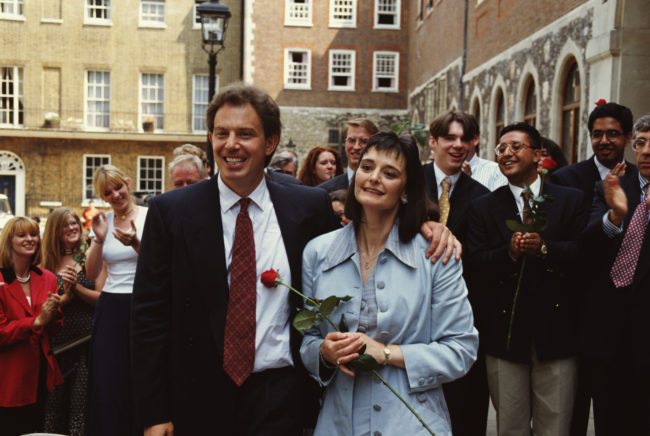
Tony Blair and Cherie Blair on the day he is elected Labour leader
We have come a long way in the last 50 years on LGBT rights, legally, socially and culturally but the path to achieving that change has felt sometimes painstakingly incremental.
When I took part in a Parliamentary debate in 1994 making the case for equalisation of the age of consent, I said that ‘the most basic civilised value is the notion of respect for other people. That is what creates and sustains any decent society’. We lost the vote on that night, but one of the privileges of being Prime Minister was that it made possible my determination to return to it and, using the Parliament Act, to see it through. It is one of the things of which I am most proud because it showed our commitment to make real progress in power.
The Labour Government championed equality and fought the pernicious prejudice which caused so much misery and made people hide their sexuality through fear. So from repealing Section 28, the Gender Recognition Act, giving same sex couples the right to adopt, outlawing discrimination in the workplace and the provision of goods and services through to the introduction of civil partnerships, we changed the social and political landscape of our country. And I was so pleased that David Cameron was able to take it further by introducing legislation for same sex marriages.
So we have come a long way over the last 50 years and it’s right to celebrate, but while there are still challenges such as pupils subject to homophobic and transphobic bullying or LGBT people having to think twice about even holding their partner’s hand walking down the street, there is still further to go.
Sir John Major (1990-1997)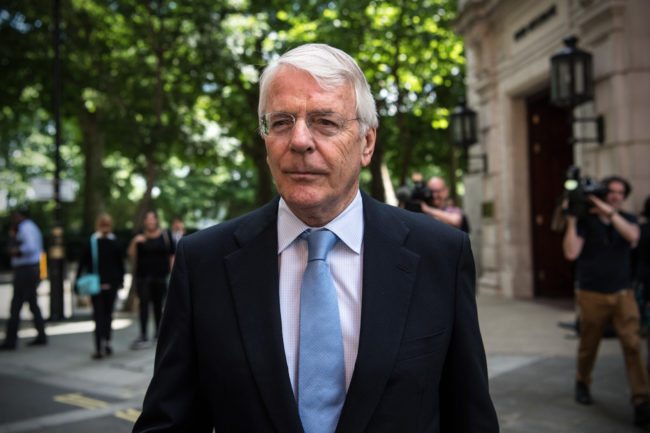 In the 1950s and 1960s, much public opinion was anti-gay. No-one would have ever imagined that so many gay people would become the icons of today.
In the 1950s and 1960s, much public opinion was anti-gay. No-one would have ever imagined that so many gay people would become the icons of today.
Today we are marking the 50th anniversary of the partial decriminalisation of homosexuality. It was the start of a long journey that would have been inconceivable in 1967. Many of those who argued for this progress in the 1950s and 1960s did not live to see the benefits of their convictions. But, today, we should remember the many efforts made by those both in and out of the public eye, for pressing for a more tolerant and accepting Britain.
Consider Alan Turing, without whom the enigma code might never have been broken; many more lives might have been lost; and the Second World War might not have been won. And yet – despite his extraordinary service to our nation – he was treated abominably. That would never happen today – and I rejoice in that.
I was fortunate enough to be in a position to end the discrimination against gay members of the Civil Service. My only regret was that this liberation was so long delayed.
I recall a very senior Civil Servant suggesting to me that one very able candidate put forward to join my Private Office might – as he put it – “attract attention” because of his lifestyle. My only thought about that proposition was that it was wrong.
I would never have denied a politician a Ministerial job on the grounds that he or she would “attract attention”, and there was no logic (or fairness) in treating civil servants any less well.
In fashioning the public mood, we need to acknowledge successes as well as challenges.
Bigotry hasn’t gone: witness the shameful hostility that was whipped up during the Brexit campaign – raising irrational fears about the effect of immigration. But, overall, such sentiments are generally in retreat and out of time.
The rigid prejudice of the past caused many people, who harmed no-one, to live in fear and isolation. No-one should be forced to live their lives in this fashion due to their personal life choices.
We are what we are. We are what fate made us. And, whatever that may be, we are entitled to give and receive affection. A life without affection is a life lacking an essential ingredient for happiness. I am proud that, overwhelmingly, most people today – and especially the young – have moved on from the social prejudices of earlier generations.
50 years on from that landmark ruling, I am happy to say that – to a greater extent than ever before – that is where we are now.

